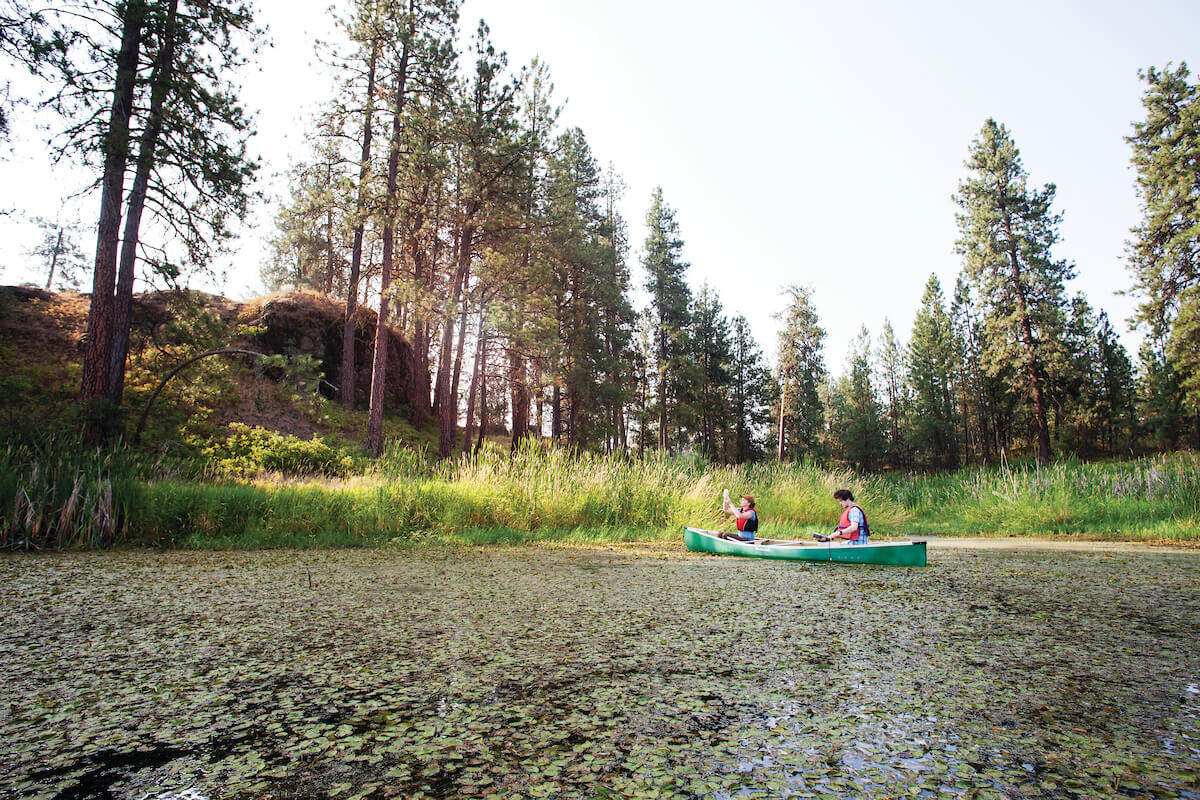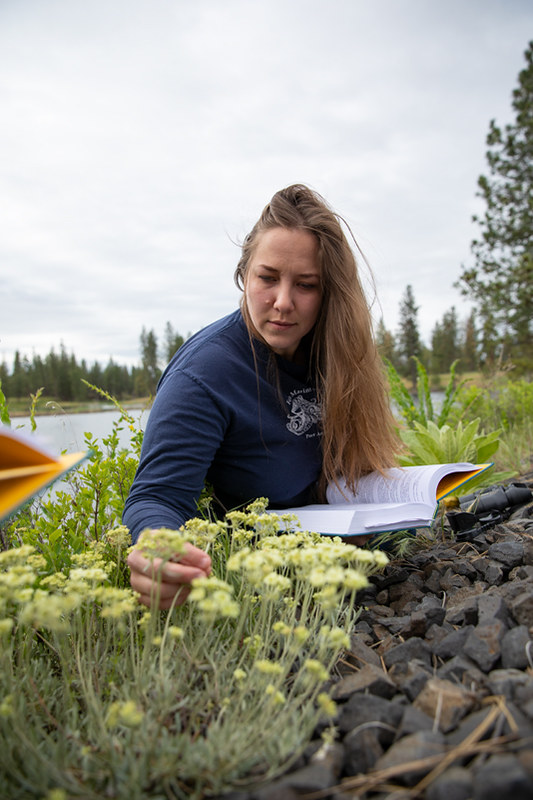Environmental Science Major with Environmental Biology Option, Bachelor of Science (BS)
Environmental Science is an interdisciplinary field that combines physical, chemical and biological sciences with social, political, and economic understanding needed to study the environment and address environmental problems. The Environmental Science program integrates classroom work in biology, chemistry, and geosciences with extensive field, lab, and research experience. Graduates leave EWU with the necessary professional and technical skills for employment in the environmental profession or entry into graduate or professional school.
Each student should meet with an advisor when declaring environmental science as a major.
| PRECALCULUS I (or equivalent) | |
&
| INTRODUCTION TO ENVIRONMENTAL SCIENCE
and INTRODUCTION TO ENVIRONMENTAL SCIENCE LAB | |
&
&
&
&
&
| BIOLOGY I
and BIOLOGY I LAB
and BIOLOGY II
and BIOLOGY II LAB
and BIOLOGY III
and BIOLOGY III LAB | |
&
&
&
&
&
| GENERAL CHEMISTRY I
and GENERAL CHEMISTRY LABORATORY I
and GENERAL CHEMISTRY II
and GENERAL CHEMISTRY LABORATORY II
and GENERAL CHEMISTRY III
and GENERAL CHEMISTRY LABORATORY III | |
&
&
| DISCOVERING GEOLOGY
and DISCOVERING GEOLOGY LAB
and THE EARTH'S CLIMATE AND WEATHER | |
| ENVIRONMENTAL SCIENCE JUNIOR SEMINAR | 1 |
| ENVIRONMENTAL SCIENCE SENIOR SEMINAR | 1 |
Note: some course options may not result in there being 60 upper division credits required for graduation within the major–advisor consultation is required.
Grade Requirements: students must maintain an average GPA ≥2.0 in the major to graduate from the program.
Note: may only count once.
& | BIOLOGY I
and BIOLOGY I LAB | 5 |
& | BIOLOGY II
and BIOLOGY II LAB | 5 |
& | BIOLOGY III
and BIOLOGY III LAB | 5 |
& | BIOLOGICAL INVESTIGATION
and BIOLOGICAL INVESTIGATION LAB | 3 |
| ECOLOGY | 4 |
&
&
&
&
& | GENERAL CHEMISTRY I
and GENERAL CHEMISTRY LABORATORY I
and GENERAL CHEMISTRY II
and GENERAL CHEMISTRY LABORATORY II
and GENERAL CHEMISTRY III
and GENERAL CHEMISTRY LABORATORY III | 15 |
| BUSINESS STATISTICS 1 (may only count BIOL 380 once) | 4-5 |
| or | DATA ANALYSIS FOR BIOLOGISTS |
| or | ELEMENTARY PROBABILITY AND STATISTICS |
| BUSINESS STATISTICS 2 (may only count BIOL 380 once) | 4-5 |
| or | DATA ANALYSIS FOR BIOLOGISTS |
| or | CALCULUS I |
| GENERAL EDUCATION ECONOMICS | 5 |
& | INTRODUCTION TO ENVIRONMENTAL SCIENCE
and INTRODUCTION TO ENVIRONMENTAL SCIENCE LAB | 5 |
| ENVIRONMENTAL SCIENCE JUNIOR SEMINAR | 1 |
| ENVIRONMENTAL SCIENCE SENIOR SEMINAR | 1 |
& | DISCOVERING GEOLOGY
and DISCOVERING GEOLOGY LAB | 5 |
| THE EARTH'S CLIMATE AND WEATHER | 5 |
& | ENVIRONMENTAL GEOLOGY
and ENVIRONMENTAL GEOLOGY LAB | 4 |
| GEOGRAPHIC INFORMATION SYSTEMS I: SPATIAL ANALYSIS FOR ENVIRONMENTAL SCIENCES | 5 |
& | GROUNDWATER HYDROLOGY
and GROUNDWATER HYDROLOGY LAB | 4 |
| ENVIRONMENTAL IMPACT STATEMENTS | 3 |
&
| MICROBIOLOGY
and MICROBIOLOGY LAB | |
&
| BOTANY
and BOTANY LAB | |
&
| INVERTEBRATE ZOOLOGY
and INVERTEBRATE ZOOLOGY LAB | |
&
| VERTEBRATE ZOOLOGY
and VERTEBRATE ZOOLOGY LAB | |
& | SENIOR CAPSTONE
and SENIOR CAPSTONE LAB | 5 |
| Total Credits | 113-115 |
The following plan of study is for a student with zero credits. Individual students may have different factors such as: credit through transfer work, Advanced Placement, Running Start, or any other type of college-level coursework that requires an individual plan.
Courses could be offered in different terms, checking the academic schedule is paramount in keeping an individual plan current. Students should connect with an advisor to ensure they are on track to graduate.
All Undergraduate students are required to meet the Undergraduate Degree Requirements.
| First Year |
|---|
| Fall Quarter | Credits | Winter Quarter | Credits | Spring Quarter | Credits |
|---|
& | 5 |
& | 5 |
& | 5 |
& (Natural Science BACR 1) | 5 |
& | 3 |
& | 5 |
| 5 |
& (Natural Science BACR 2) | 5 | | 5 |
| | Elective - minor or general elective | 4 | |
| | 15 | | 17 | | 15 |
| Second Year |
|---|
| Fall Quarter | Credits | Winter Quarter | Credits | Spring Quarter | Credits |
|---|
& | 5 |
& (BIOL 302 & BIOL 302L, BIOL 303 & BIOL 303L, BIOL 304 & BIOL 304L) | 5 | , , or | 4-5 |
| 5 |
& | 5 | | 5 |
| 5 | or | 5 | Humanities & Arts BACR 11 | 5 |
| | 15 | | 15 | | 14-15 |
| Third Year |
|---|
| Fall Quarter | Credits | Winter Quarter | Credits | Spring Quarter | Credits |
|---|
| 4 |
& | 4 | , , or | 4-5 |
| (Social Science BACR 1) | 5 | Humanities & Arts BACR 21 | 5 | Environmental Biology Elective2 | 5 |
| 1 | Social Science BACR 21 | 5 | Diversity - graduation requirement1 | 5 |
| Environmental Biology Elective | 5 | | |
| | 15 | | 14 | | 14-15 |
| Fourth Year |
|---|
| Fall Quarter | Credits | Winter Quarter | Credits | Spring Quarter | Credits |
|---|
& | 4 |
& (Senior Capstone - graduation requirement) | 5 | Global Studies - graduation requirement1 | 5 |
| 3 | | 1 | Elective - minor or general elective | 5 |
| Environmental Biology Elective2 | 5 | Environmental Biology Elective2 | 5 | Elective - minor or general elective | 5 |
| Elective - minor or general elective | 4 | Elective - minor or general elective | 4 | |
| | 16 | | 15 | | 15 |
| Total Credits 180-182 |
Students who earn a BS in Environmental Science with Environmental Biology from EWU should be able to:
- demonstrate effective oral, graphical, and written communication abilities, and critical thinking skills as related to the environmental sciences;
- demonstrate knowledge of the interrelationships among the physical and biological components of ecosystems;
- develop an integrated knowledge of major concepts in the area of environmental sciences and an understanding of fundamental roles that biology, chemistry, and geology play in environmental science;
- develop sufficient preparation in the environmental sciences to successfully compete in a graduate or professional program, or to realize employment in an environmental sciences-related career;
- use epistemologically sound quantitative techniques for the analysis of biotic and abiotic samples and systems.




